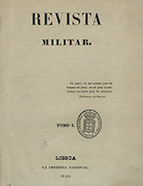

................................
The military historiographical writing showcased in these periodicals, even if we consider only the Revista Militar , provides significant scientific value to the institution to which it is intrinsically connected while also offering benefits to civil society. It's not without its controversies, traditions, and sweeping opinions, not infrequently tinged with historicist traditionalism, but—not least because history is opinion and the expression of feelings—identities, values, and examples to follow are praised. Just as ancient thinkers argued that history is the "teacher of life", the military institution "feels and lives" history as no other organisation does. This aspect, perhaps sentimental and shaping behaviour and codes of conduct, represents crucial milestones in our cultural identity as a nation, where the concepts of "defence" and "war" are evolving notions, continually adapting and solidifying through social progress. Military history, a field under constant scientific scrutiny, is an integral part of history itself. As a shaper of conceptions, it serves as a cornerstone for the cohesion and unity of a country, nation, or homeland, contributing to Portugal's progress, as symbolised by the motto "Pro Patria," prominently displayed on its coat of arms.
It is important to disseminate history, not just what is understood as "Homeland History" or "Military History." Even if it is imbued with nationalism, it is also important to promote our culture, which is so dear to the military institution. This is one of the reasons why publications such as Revista Militar, along with other contemporary periodicals, embody a concerted effort by the armed forces to communicate their objectives. In these publications, history serves as a fundamental source of military, civic, and academic authority and tradition.
This work is financed by national funds through FCT - Foundation for Science and Technology, I.P, in the scope of the projects UIDB/04311/2020 and UIDP/04311/2020.
